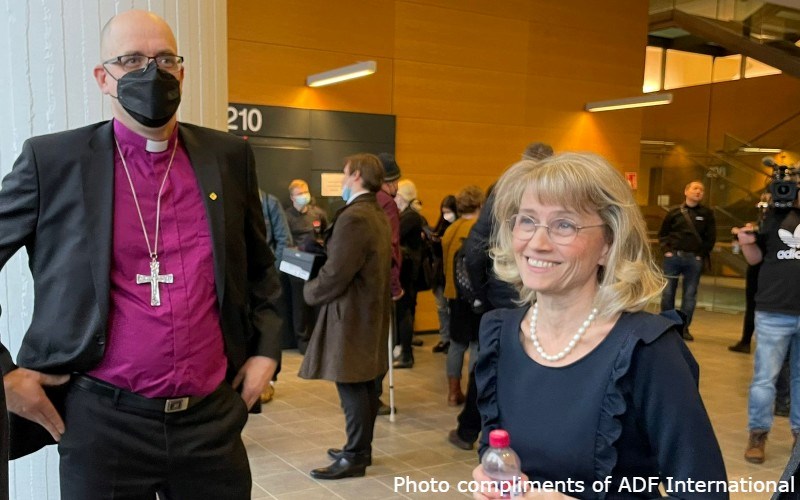Paivi Rasanen was serving as an elected member of Finland's parliament when she posted a comment on Twitter in 2019 opposing her church’s participation in a homosexual "pride" event in Helsinki, the capital city.
Rasanen belongs to the liberal Evangelical Lutheran Church of Finland, as do approximately 70% of Finland, where church attendance is in the single digits. But she is the exception to the nation's post-Christian landscape and so she shamed church leaders with Scripture when they sponsored the event. Her post included a Bible verse from Romans and for that she was charged under Finland’s criminal code section for “war crimes and crimes against humanity.”
AFN reported in March 2022 when a court ruled in her favor, but her attorneys predicted at the time prosecutors would appeal the ruling because of political pressure to make an example of Rasanen. That appeal was filed as predicted and now the defendant has won again.
“It is a monumental victory," attorney Kristen Waggoner, who leads Alliance Defending Freedom, said on Washington Watch Tuesday. "They say the process is the punishment: four years of penalties hanging over Paivi’s head of not knowing what the future holds, of interrogations and charges."
Rasanen was charged for her 2019 tweet, for comments she made in a 2019 live radio debate, and for a 2004 church pamphlet she had written before the law had taken effect.

Lutheran bishop Juhana Pohjola was charged and put on trial for passing around the pamphlet.
The state has until mid-January to appeal to the Finnish Supreme Court.
So far, Rasanen and Pohjola have won two court rulings, both with unanimous verdicts.
“It does set national precedent, so that precedent should apply to others in this situation. Rogue prosecutors can try to distinguish that precedent in the future. I do think it also points out the importance of citizens standing though,” Waggoner told show host Tony Perkins. “Many of the nations throughout civilization have had constitutions or laws protect free speech and religious freedom, but those laws aren’t worth the paper they’re written on if the citizens become apathetic or don’t enforce them.”
Last week Mark Houck, a pro-life activist, filed a lawsuit against The Department of Justice charging it with what he called “a faulty investigation” and “excessive force” after a SWAT team of around 25 federal agents arrested him at his home in rural Pennsylvania in front of his children.
Houck was acquitted on Jan. 30 of charges that he violated the Freedom of Access to Clinic Entrances (FACE) Act during an alleged altercation with an abortion escort outside a clinic in 2021.
Two free speech cases in Mexico did not end well as former congressman Rodrigo Ivan Cortes and current congressman Gabriel Quadri have been found guilty of speech crimes against biological males who say they are women.
Cortes and Quadri have exhausted all avenues of appeal.
Thursday, Adam Smith-Connor will go to trial in England for praying silently near an abortion facility.
Free speech rights: Use them or lose them
Citizens need to understand the freedoms that can potentially be lost if they remain silent in the face of unlawful prosecution, Waggoner said.
“We lose the right not only to speak about and live out the truth in our own lives, but we lose the right of self-government. We blur the lines with dictatorships and give totalitarian and authoritarian regimes power to silence the truth and to silence debate on issues. It’s a very dangerous precedent that this prosecutor tried to set here,” she said.
Waggoner is hopeful that two unanimous verdicts will cause Finland lawmakers to reconsider a process that allows the state to go after a citizen for four years in such cases.
“These laws that essentially create hate crimes out of what they call hate speech, they’re very vague, they’re subjective and can be interpreted and applied in all kinds of different ways. They’re very destructive and dangerous, and we see them proliferating throughout Western Europe,” Waggoner said.







